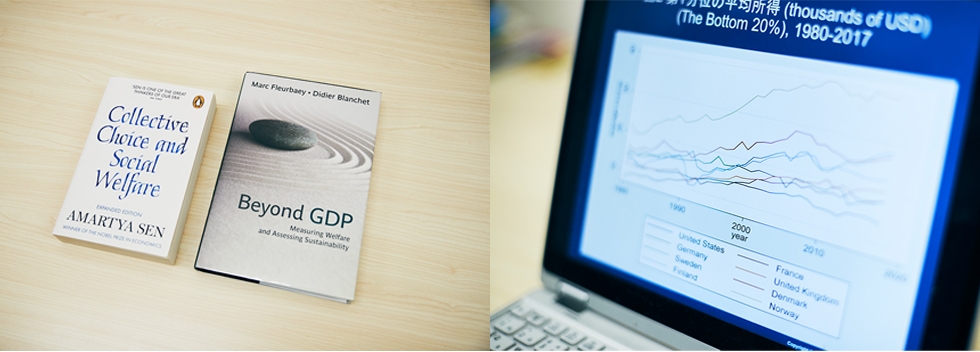I teach a variety of economics courses aimed at everyone from first year students to graduate students. Courses for first and second year students cover a wide range of introductory and beginner level economics content. Because economics encompasses a large number of research areas, I try to get students to study as many topics as possible instead of limiting themselves to just one area; that way, they can gain an understanding of the relationship between social, political and economic problems. Courses for third year students and up focus on the concrete uses of economics, such as how economics can be applied and how statistical analysis methods and mathematical model analysis can help in understanding social, political and economic phenomena. Sadly, there is the common misconception that economics is the “study of making money.” While the search for better management methods and analyzing the mechanisms that determine stock prices and exchange rates are part of economics, they are not all it is about. Economics was originally a discipline concerned with analyzing human behavior in order to figure out how to build a better society. In other words, it is equally essential for both students of the sciences and students of the humanities to be good citizens.

The problems of poverty and inequality that I occasionally discuss in my lectures are problems which cannot be simply explained away as “someone else’s concern,” an “issue of personal responsibility” or a “necessary social evil.” Ignoring these problems leads to a variety of ill effects for all people, including deteriorating public security, increased societal vulnerability to infectious disease, increased health disparities, increased danger of revolutions, riots, wars and social unrest, and diminished social vitality due to inequality of opportunity and other factors. As part of my lectures every year, I create a survey for students which contains questions such as “How much should be redistributed to people with lower incomes?” and “How equal should access to education and health care be?” in order to ascertain their perceptions of fairness regarding inequality and poverty. From this survey, I see that almost no students are okay with extreme disparity and that the current Anglosphere represents a society of excessive disparity that almost no Japanese person would be okay with. By properly understanding the mechanisms of poverty and inequality and then fairly selecting effective methods for correcting them, we can build a better society. My desire is to equip students with correct knowledge and sound thinking which will enable them to become exemplary contributors to both Japanese society and the international community.

■ Main courses and research area